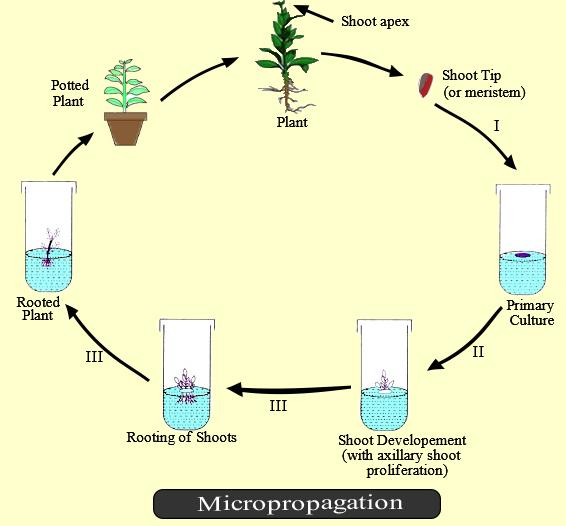
What is the major advantage of producing plants by micropropagation?
Answer
580.2k+ views
Hint: Micropropagation is the process of propagation by growing the plantlets in tissue culture and then planting it. This step-wise process has several benefits in the production of plants with desired characteristics.
Complete answer:
Micropropagation, an alternative to vegetative propagation, has several advantages in the case of plant production. By applying this process, a large number of plants can be produced in a short time span. Plus, the produced plants are pathogen-free and identical to the mother plant. This method is very cost-effective as well.
Additional Information: Let us know more about micropropagation:
Micropropagation is an artificial process of plant production by tissue culture or cell culture techniques. These plants are produced Vegetatively. It was first discovered by Cornell University botanist Frederick Campion Steward.
Methods- The process of micropropagation has 5 different methods namely Meristem culture, Callus culture, Suspension culture, Embryo culture, and protoplast culture.
In the case of meristem culture, the Meristem and few leaf primordia are placed in their suitable growing media which gives rise to an elongated rooted plantlet. This process produces disease-free plants and rapid multiplication of various plant materials like sugarcane, strawberry, etc.
In callus culture, selected tissue is placed in a growing medium to form a callus and later transferred to a culture medium containing plant growth regulators. After some days, the new plantlet is exposed to the Environmental condition.
Single cells or small groups of cells are placed in an agitated liquid growth medium in case of suspension culture.
In the case of embryo culture, the embryo is excised and placed in a proper nutrient medium in aseptic conditions. It helps in the Production of interspecific and intergeneric hybrids and to overcome the embryo.
The plant cell is isolated with the help of wall degrading enzymes in protoplast culture. In suitable conditions, the cell forms a cell wall followed by an increase in cell division and later grows into a new plant.
Note: Although the process of micropropagation is very beneficial it has disadvantages as well. The plants produced through this process are not autotrophic and are not suitable to be applied to all the crops. Above that, the plants produced through this process find it difficult to acclimatize to the natural environment.

Complete answer:
Micropropagation, an alternative to vegetative propagation, has several advantages in the case of plant production. By applying this process, a large number of plants can be produced in a short time span. Plus, the produced plants are pathogen-free and identical to the mother plant. This method is very cost-effective as well.
Additional Information: Let us know more about micropropagation:
Micropropagation is an artificial process of plant production by tissue culture or cell culture techniques. These plants are produced Vegetatively. It was first discovered by Cornell University botanist Frederick Campion Steward.
Methods- The process of micropropagation has 5 different methods namely Meristem culture, Callus culture, Suspension culture, Embryo culture, and protoplast culture.
In the case of meristem culture, the Meristem and few leaf primordia are placed in their suitable growing media which gives rise to an elongated rooted plantlet. This process produces disease-free plants and rapid multiplication of various plant materials like sugarcane, strawberry, etc.
In callus culture, selected tissue is placed in a growing medium to form a callus and later transferred to a culture medium containing plant growth regulators. After some days, the new plantlet is exposed to the Environmental condition.
Single cells or small groups of cells are placed in an agitated liquid growth medium in case of suspension culture.
In the case of embryo culture, the embryo is excised and placed in a proper nutrient medium in aseptic conditions. It helps in the Production of interspecific and intergeneric hybrids and to overcome the embryo.
The plant cell is isolated with the help of wall degrading enzymes in protoplast culture. In suitable conditions, the cell forms a cell wall followed by an increase in cell division and later grows into a new plant.
Note: Although the process of micropropagation is very beneficial it has disadvantages as well. The plants produced through this process are not autotrophic and are not suitable to be applied to all the crops. Above that, the plants produced through this process find it difficult to acclimatize to the natural environment.

Recently Updated Pages
Master Class 11 Business Studies: Engaging Questions & Answers for Success

Master Class 11 Computer Science: Engaging Questions & Answers for Success

Master Class 11 Economics: Engaging Questions & Answers for Success

Master Class 11 Social Science: Engaging Questions & Answers for Success

Master Class 11 English: Engaging Questions & Answers for Success

Master Class 11 Chemistry: Engaging Questions & Answers for Success

Trending doubts
Draw a diagram of nephron and explain its structur class 11 biology CBSE

Explain zero factorial class 11 maths CBSE

Chemical formula of Bleaching powder is A Ca2OCl2 B class 11 chemistry CBSE

Name the part of the brain responsible for the precision class 11 biology CBSE

The growth of tendril in pea plants is due to AEffect class 11 biology CBSE

One Metric ton is equal to kg A 10000 B 1000 C 100 class 11 physics CBSE




